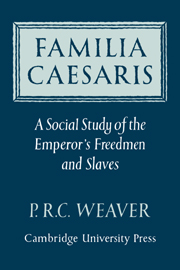Book contents
- Frontmatter
- Contents
- Preface
- Abbreviations
- INTRODUCTION
- PART I NOMENCLATURE AND CHRONOLOGY
- PART II THE FAMILY CIRCLE
- PART III THE EMPEROR'S SERVICE
- 12 Vicarii
- 13 Liberti servus and liberti libertus
- 14 ‘Vicariani’
- 15 The occupational hierarchy: some points of method
- 16 Sub-clerical grades
- 17 Adiutores: junior clerical grades
- 18 Intermediate clerical grades
- 19 Senior clerical grades
- 20 Senior administrative grades: a rationibus, ab epistulis, etc.
- 21 Freedman procurators
- 22 Imperial freedmen and equestrian status: the father of Claudius Etruscus
- CONCLUSION
- APPENDIXES
- Bibliography
- Index
- Frontmatter
- Contents
- Preface
- Abbreviations
- INTRODUCTION
- PART I NOMENCLATURE AND CHRONOLOGY
- PART II THE FAMILY CIRCLE
- PART III THE EMPEROR'S SERVICE
- 12 Vicarii
- 13 Liberti servus and liberti libertus
- 14 ‘Vicariani’
- 15 The occupational hierarchy: some points of method
- 16 Sub-clerical grades
- 17 Adiutores: junior clerical grades
- 18 Intermediate clerical grades
- 19 Senior clerical grades
- 20 Senior administrative grades: a rationibus, ab epistulis, etc.
- 21 Freedman procurators
- 22 Imperial freedmen and equestrian status: the father of Claudius Etruscus
- CONCLUSION
- APPENDIXES
- Bibliography
- Index
Summary
Higher in legal and occupational status than either of the two preceding groups are what I have called the ‘vicariani’. The use of the term ‘vicarianus’ in the early Empire requires explanation.
Imperial freedmen and slaves in the period from Augustus to Trajan frequently exhibit in their inscriptions second names (agnomina) ending usually in -ianus, sometimes in -anus, and occasionally in -inus. These names are derived from the nomen or cognomen of a former master from whose familia they have passed either by gift, purchase or inheritance into the Familia Caesaris. Such agnomina are found in only a comparatively small minority of the total inscriptions of each class and period – not more than 6% of all Imperial freedmen with or without nomen from the Iulii to the Ulpii,and about the same proportion of all Imperial slaves from Augustus to Hadrian.
If every slave of a Roman master on being transferred to the ownership of the emperor regularly took a second name derived from his former owner, we would possess valuable information on the sources of recruitment of the Familia Caesaris for the first century and a half of its existence. Unfortunately this is not so. Even allowing for the incomplete nature of the inscriptional evidence, it is difficult to believe that under 10% of the Familia Caesaris – although the figure is nearer 12% for the Iulii and Claudii – was recruited from such sources in the first century ad.
- Type
- Chapter
- Information
- Familia CaesarisA Social Study of the Emperor's Freedmen and Slaves, pp. 212 - 223Publisher: Cambridge University PressPrint publication year: 1972



